INTRODUCTION
The South Pacific Institute for Sustainable Agriculture & Rural Development (SPISARD) is a center for the promotion of rural development through the Department of Agriculture of the Papua New Guinea University of Technology (Unitech). It is tasked to develop conduit location and farming system, specific extension method and approaches, providing training and transfer of sustainable agricultural technology, providing applied and development oriented research on food and cash crops, livestock and the development of appropriate farm implements. The target is to improve and attain sustainable integrated farming system practices suitable for the subsistence and semi-subsistence farming community with minimum impact on the quality of the environment. The institute is operated through an educational model village concept. Model villages are been established over various agro-ecological zones in the country. These model villages become conduit points for research, training and extension with active farmer participation. This approach is quite different and unique to the existing ones in that the development process takes place in the farmers’ environment with immediate “real time” feedback mechanisms based on the farmers’ perspective and satisfaction and using students and educational institute.
The development of SPISARD is an initiative of the Agriculture Department. It is an apparent common knowledge that agriculture extension has been a big setback in rural agriculture development and many approaches have been tried and adopted as means of alleviating the extension deficiencies. The department joins the research into extension adoption for sustainability in agriculture. It endeavors to attain a unified cohesive approach to delivering agricultural extension services to rural farmers. Some weaknesses identified within the rural agricultural sector in the country include:
- an absence of a coordinated approach to the development and transfer of appropriate farming techniques for rural farmers;
- an absence of technical research information in forms suitable to subsistence farmers’ needs;
- an absence of coordinated training for agricultural extension agents in the transfer of agricultural technology;
- an absence of a systems approach to improving the farming systems, and;
- a general lack of access to markets, credit facilities and agro-business information to farmers.
It is envisaged that SPISARD’s educational model village approach will correct and improve some of the above weaknesses (many of which are highlighted in the “Strategy of National Agricultural Development Horizon 2010 Report” and “PNGs vision 2050”) and improve productivity, sustainable income generation, nutrition and food security, and maintain environmental quality and standards of living of rural PNG. Thus, the establishment of SPISARD will complement the PNG organic law, which focuses on improving services to the rural villages and communities.
HISTORY
SPISARD was established in 2003, the Agriculture Department’s HOD, Professor A. Halim, Mr. P. Manus and Dr. M. Komolong have been working very hard to put in place the institute and initiate two model villages at Tumua and Situm villages in Morobe Province.In March 2004, Mr. William Nano was recruited as A/Director of SPISARD. Dr.Veonica Bue was engaged in 2005 to do her MPil and research in model villages activities with woman in Tumua village Kaiapit District, Morobe Province. Miss Betty Tiko was employed in 2008 as coordinator of SPISARD woman and youth activities. Miss Deborah Meana was recruited in 2013 to coordinate the office and start SPISARD radio program “VOICE of UNITECH AGRICULTURE DEPARTMENT TO RURAL VILLAGES OF PNG”. However, she resigned in 2014 for personal reasons. Most recently, this year, Miss Rhonda Page was recruited to continue in our office and the radio program. Presently the Director of SPISARD is William Nano.
SPISARD is in operation for twelve years since its inception in 2003. SPISARD has been conducting trainings to number of rural communities, urban settlements, and church and women groups using the most convenient approach. Its activities had captured the interest and attention of industries, research institutions, non-government organizations, schools and the farmers and unemployed men, women and youths in urban settlements. In the past nine years SPISARD has contributed meaningfully and significantly to the lives of unemployed people in rural villages and urban settlements in Papua New Guinea. SPISARD is a unique concept as it is a much broader area than just agricultural production. It includes resource management, education, health, local level governments, gender issues, issues on Aids/HIV and other relevant programmes that affect people, their lives and livelihoods. I believe in due time that its relevance will be a blooming delight to its stakeholders and community people. The Institute is increasingly associated with linkages and collaboration efforts, bringing together knowledge (traditional and modern) and interests of all the stakeholders involved in development or problem solving rather than only transferring of expert solutions. It is about fostering communications, learning and the mutual search for improved lifestyle. It involves the active participation of rural villagers in sustainable resource management and enterprise development (hence enabling them to be self-reliant and putting a stop to the currently prevalent “handout mentality” which is ‘eating’ away many rural villagers and communities) and leaving them in great dilemma and leaders’ in confusion. It is about looking back over the past years’ performances and looking forward in the years to come and hence set a good course to follow.In the last ten years SPISARD has established model villages as conduit points for research and development in different agro-ecological zones.
Management and stuff
Since the establishment of SPISARD, no members have been appointed for the SPISARD Board of Management, however, certain respectable persons are being approached and we are in the process of forming a Special Board of Management (SBOM). Those who have been approached to be members of the board will compose of senior Unitech staff and key stakeholders in industry. The SBOM will have the responsibility for the overall direction and answerable to the Vice Chancellor of the Papua New Guinea University of Technology.
Staff
The staffs of SPISARD are employees of Unitech and are managed by the A/Director of SPISARD. The A/Director of SPISARD reports directly to the HOD of the Department of Agriculture (Unitech) and all SPISARD staffs are part of the Department of Agriculture.
Positions of Staff
- Director
- Research Assistant
- Secretary
These positions are currently being reviewed and are in the process of being approved by the University Management.
Vision and strategic plan
VISION
The vision of the institute is to be dynamic and innovative in providing leadership and lifelong learning in traditional and modern extension and sustainable agriculture development positively impacting on rural environment and communities in Papua New Guinea, Melanesia and South Pacific Islands.
MISSION
The mission of SPISARD is to:
- Collaboratively advance the development of model villages and improve the skills of the people involved in the rural development processes;
- Create, foster and implement collaborative action and learning opportunities through demonstration projects and learning centers;
- In addition, direct participation of farmers in the pursuit to improving their farming systems to increase productivity and income, to secure food security and nutrition, and to ensure no damage comes to the environment in due process.
Functions
The functions of the institute are:
- To conduct applied research in sustainable agriculture, extension training and rural development;
- To train and develop human resource needs of agriculture and community development in P.N.G., Melanesia and the Pacific Islands;
- To develop and promote appropriate farm implements;
- To develop appropriate post-harvest and food preservation technology and promote nutrition;
- To provide agriculture extension services, including technical information in suitable forms to farmers;
- To develop and transfer improved agricultural technology to the rural people (farmers);
- To develop appropriate extension methods;
- To evaluate research, extension and rural development policies;
- To provide advisory services to the government, private and rural communities;
- To preserve and promote agricultural bio-diversity in crops and livestock farming;
- To popularize rice cultivation;
- To initiate aquaculture, agro-forestry and social forestry;
- To promote and harness traditional farming systems and their environmental control & land usage.
Programmes
The SPISARD has five (5) programs:
- Capacity Building
This deals with the development of the University Farm, model villages, training centers, academic staff and procurement of resources and their management.
- Research
This deals with the development of appropriate and sustainable agricultural technology and extension methods.
- Training
This deals with the development of human resources for technology transfer.
- Extension & Technology Transfer
This deals with the transfer of appropriate information and technology to men, women and youth of the farming community.
- Traditional Farming Systems
This deals with reviving, rebuilding and researching of our traditional ways of farming, means of environmental control and land usage.\
Activities and implementation
Since the establishment of SPISARD in 2003, the Agriculture Department’s HOD, Professor A. Halim, Mr. P. Manus and Dr. M. Komolong have been working very hard to put in place the institute and to initiate model villages at Tumua and Situm villages in Morobe Province.
Model Villages
In March 2004, Mr. William Nano was recruited as A/Director of SPISARD. Since then he has been working on the model villages’ sites, especially in Tumua Village, Panamecho Village and West Taraka ex-servicemen’s blocks: A collaborated arrangement with our agriculture staff. Mr. M. Maino to work in Hamara Village (Oro Province) and forestry in Sibalai Village (Milne Bay Province) by Mr. Ofara Petilani. The establishment of the Programme Management and Board of Management were rather slow due to technical and financial constraints. However, these problems have been corrected this year (2005) and as a result, the meeting was carried out.
Rural Development
Much of this year’s work was concentrated on baseline survey of the agro-socio-economic and farming systems studies. Due to financial and staffing constraints, our planned activities concentrated only in Morobe Province, particularly Tumua Village and West Taraka ex-servicemen’s blocks. However, thanks to collaborative efforts we were able to perform surveys in Panamecho Village (New Ireland Province), Hamara Village (Oro Province) and Sibalai Village (Milne Bay Province). This fits very much into the SPISARD Agro-inter zonal programme. The data information of these Agro-zone surveys will be available but will not be used until such time that funding is available. Initially, our programme in SPISARD will only concentrate on properly establishing the model villages already created in Morobe Province.Besides the baseline surveys, some work have been done on generation of farm technology, extension methods and capacity building programmes.
Due to financial and staffing constraints, our planned activities concentrated only in Morobe Province, particularly Tumua Village and West Taraka ex-servicemen’s blocks. However, thanks to collaborative efforts we were able to perform surveys in Panamecho Village (New Ireland Province), Hamara Village (Oro Province) and Sibalai Village (Milne Bay Province). This fits very much into the SPISARD Agro-inter zonal programme. The data information of these Agro-zone surveys will be available but will not be used until such time that funding is available. Initially, our programme in SPISARD will only concentrate on properly establishing the model villages already created in Morobe Province.Besides the baseline surveys, some work have been done on generation of farm technology, extension methods and capacity building programmes.
5-1.4 Tumua Village Study
The Tumua Village agro-socio-economic and farming systems baseline survey was conducted and upon completion, a report was prepared which contains all the recommendations. Following the recommendations, the following activities were conducted:
- Tumua Clan leaders’ meeting convene.
-
A water service survey study conducted and reports presented
- Mr. Sali Bafun [Civil Engineering Dept.] – No report
- Mr. Memafu Meninga [ATCDI] – Report presented
-
A family need workshop conducted and report presented (After this study, several visiting trips were taken)
- Dr. B. Goddard – ACIAR consultant to the Agriculture Department
- Environment Management Research Board & Committee (EMRC) team’s visit – It was done to evaluate the noni farming project in Tumua
-
Professor A. Halim’s [HOD Agriculture Department] visit, accompanied by:
- Dr. Muneer [Senior Soil Scientist – Agriculture Dept.]
- Fourth (4th) year students [Agriculture extension students – 2004]
- Mr. Jimmy Apety [D/HOD & Entomology lecturer]
In Tumua Village, the construction of a model village house is underway and is near completion. Tumua Village is now one of the bases of our model village concept activity centre in the Morobe Province. It is anticipated that work on the model house will be finished by end of April this year and activities may commence.
5.1.5 Panamecho Village Study
This report is based on the agro-socio-economic and farming systems baseline survey performed in Panamecho Village during the Christmas holiday of 2004. After the completion of the survey, all data was tabulated and at the request of the villagers, a seminar was conducted to present the results of the survey.The following activities were carried out in Panamecho Village:
- Agro-socio-economic and farming systems baseline survey
- Agro-socio-economic and farming systems Seminar
- Agro-socio-economic and farming systems time management workshop
- Pig workshop and production workshop
- Evaluation of sea reef fish farming management systems study
- Agro by product – house food residual study
- Information cost survey
- Informal economic sector study – backyard marketing
- Model house completed and ready for workshops, research, etc.
5.1.6 Hamara Village Study
This study was conducted by Mr. McQueen Maino [Crops Breeder lecturer – Agriculture Dept.], an example of the Agriculture Dept. staffs’ collaborative work for SPISARD. The results and report are presented by Mr. M. Maino.
5.1.7 Sibalai Village Study
Mr. Ofara Petilani [Lecturer with the Forestry Dept.] conducted this study as a collaborative work for SPISARD. Mr. Petilani’s report is completed and ready for presentation. Some of the work Mr. Petilani and the Sibalai villagers achieved are:
- He also completed the Mine Bay information cost survey.
5.1.8 The West Taraka Rice Project
This is, to some degree, a controversial development because SPISARD did not have West Taraka in view yet, due to the sensitive law and order issues there making the place (West Taraka) an ‘unsuitable’ site for carrying out such studies. However, the people were desperate and eventually fronted up at the SPISARD office after hearing some rumors about SPISARD from the ‘grape-vine’. The experience with West Taraka is very sensitive and needed a lot of collaborative work between all concerned; Provincial Government, PDAL, Unitech, NGO’s, etc. Their needs (West Taraka Community) are very desperate, however, the methods of how to go about giving help to them has to be planned out carefully before being executed. The West Taraka communities’ cry for help, especially in rice farming. Something must be done collaboratively. Below is a summary of what has been done so far:
- Several meetings have been conveved with the concerned groups
- On site walks, inspection and evaluation has been carried out
- Meeting the West Taraka youth rice project
-
Rice Demonstration for the West Taraka youths and block-holders’
- Preparation of land
- Ploughing episode
- Registration of the West Taraka Block-holders Rice Group
- West Taraka life seminar for the youths
All the above activities were conducted with great care and caution because of West Taraka’s reputation. After the ploughing of the demonstration field experience, the work with West Taraka was put to a stop. PDAL Lae was last heard continuing with the rice project. However, their desperation for improved life has drawn them to keep enquiring for help, particularly with rice development
5.1.9 Other activities summary
Melbourne Visit
This year started off with a collaborative study visit to Melbourne University, Australia, sponsored by ACIAR and UNITECH and Melbourne University. This visit Prof. Dennis O’Brian of UOM and Mr. Kerua organized a possible farming systems linked studies between University of Melbourne and the Papua New University of Technology Mr. Kerua , Mrs. Bue and Mr.Nano, went for this study tour, in February 2008.
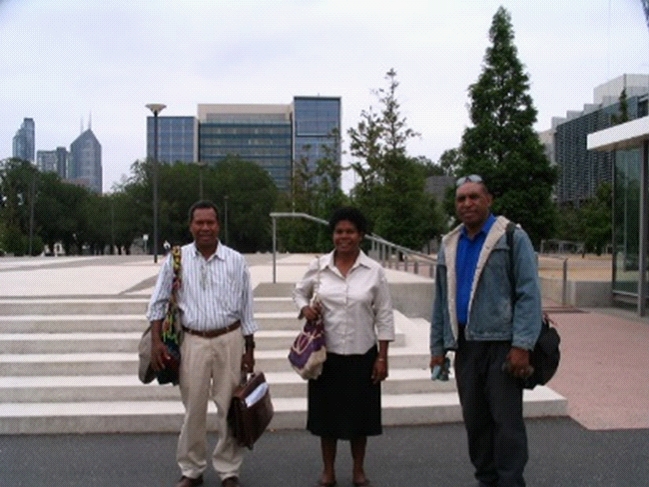
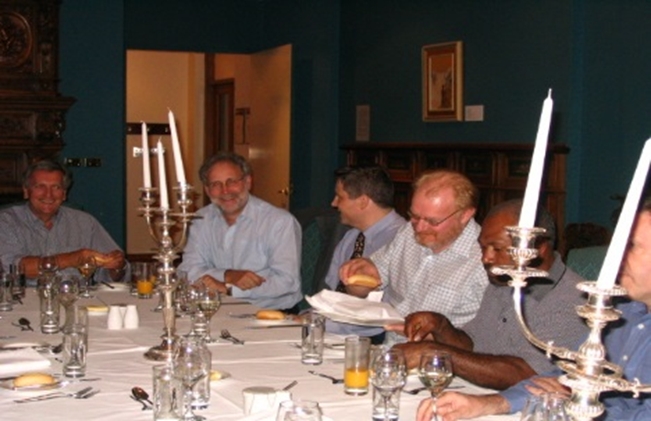
Nano,Bue,Kerua-melbourne crawfort fund dinner for the visit
This year we concentrated our efforts on the highlands provinces and visited three of the five provinces. Summary of the trainings are shown below
Eastern Highlands Province
Hafaru model village
Sewing -85 people were trained-3 men and 82 women
Basics of sewing –pattern making and making clothes and handling sewing machines and maintenance. The participants were given certificates of attainments at the end of the training
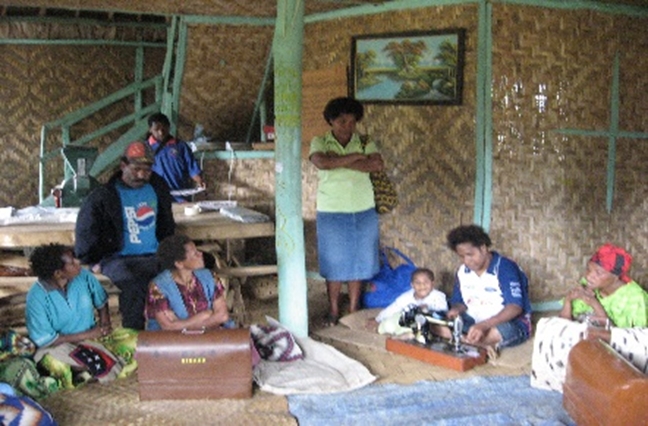
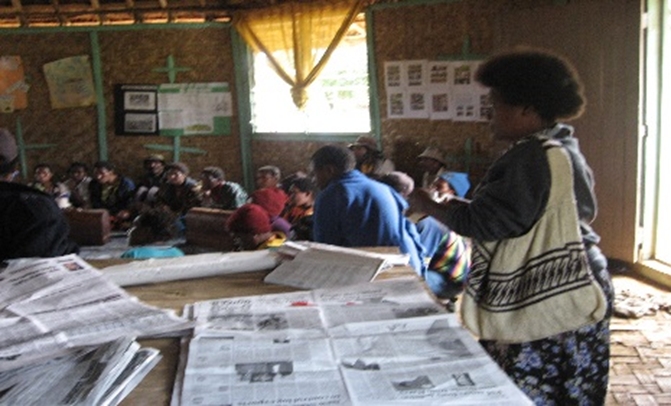
Demonstration handling machines Teaching how to make patterns
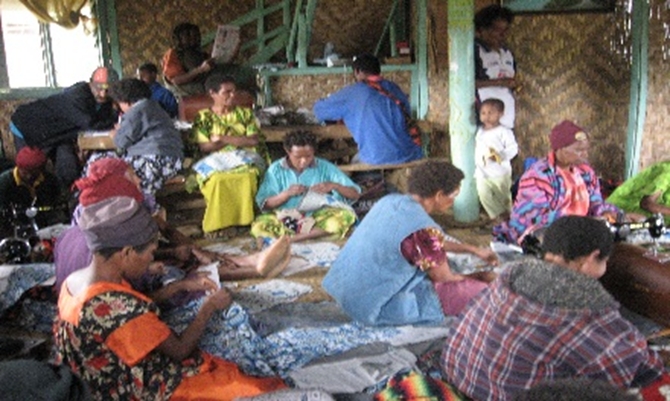
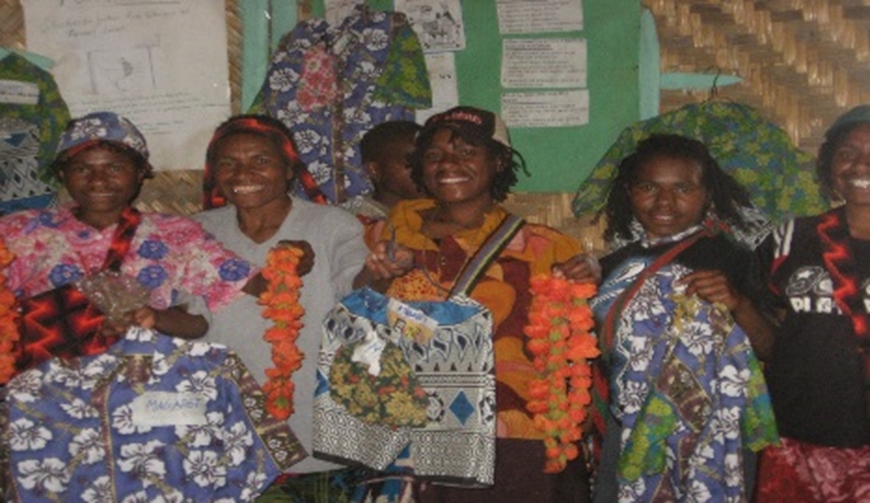
On the job sewing Displaying of sewing products
Hafaru –Inland fish farmers training
We introduce inland fish farming in 2006 and so we follow up with a training
In this training we concentrate on pond construction and management and simple fish ingredient identifications and formulation
Fish harvest and tasting.
Total of 50 men attended this training. certificates of attainment were awarded at the end of training.
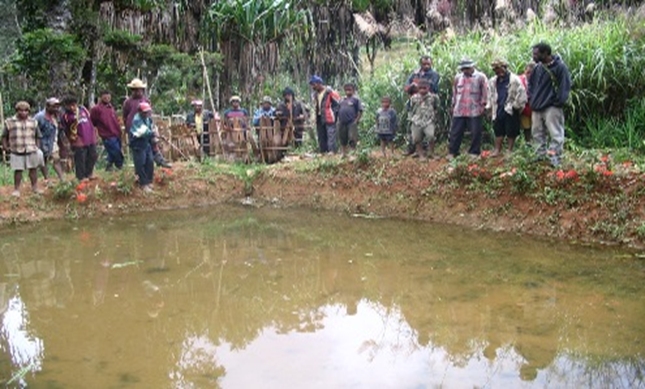
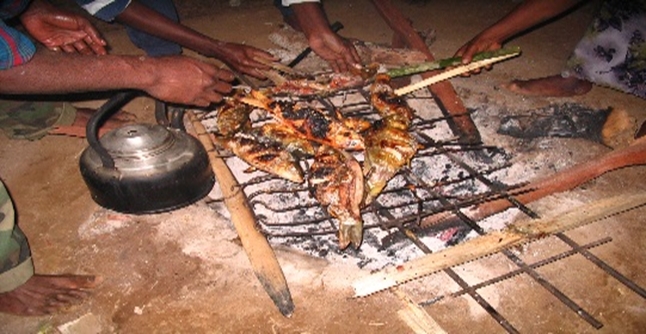
Fish farmers on field inspection Fish roasted for tasting
Jiwaka Province
Kerowil model village
This is a new model village which W.Kerua and W.Nano started when they went to CLTC Banz for ACIAR Broiler Chicken and local feeds review.
In this training a total of five subjects were taught.
- cassava composite bread making
- marita oil making
- sugar making from sugar cane
- peanut butter and jam making
total -105 people -30 men and 75 women certificates of attainmaents were awarded.
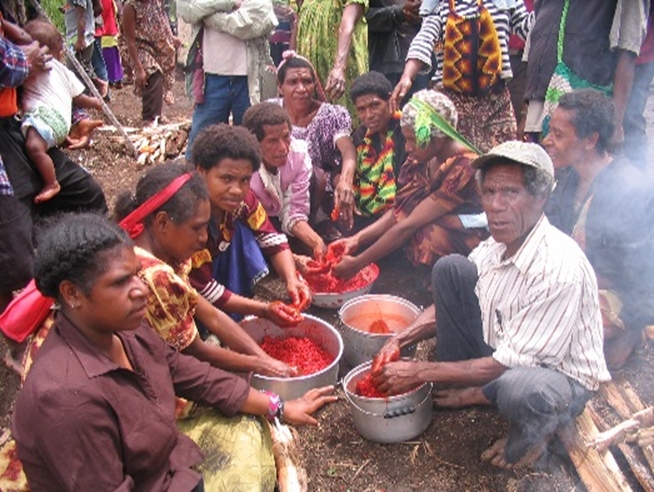
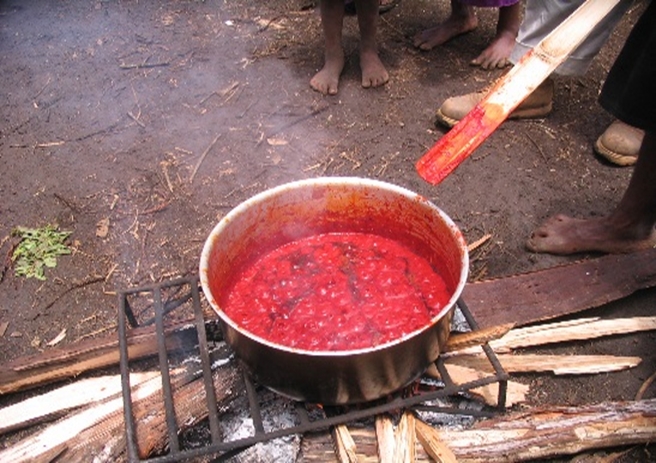
Women preparing and making marita oil
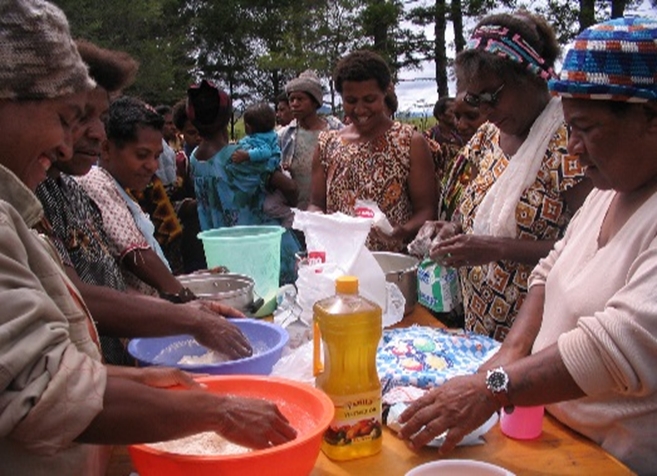
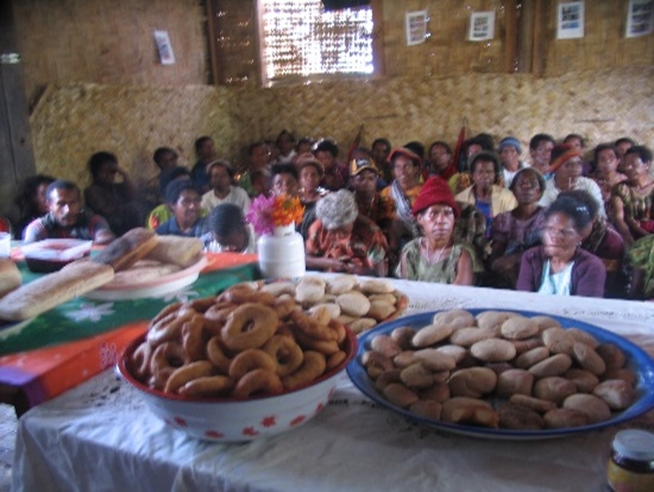
Women preparing cassava products Participants enjoying the final products
Enga Province
Tsak valley model village
A total of 50 people were trained -35 women,15 men
Trainings-
1.kaukau composite bread
2.sugar making
3.peanut butter and jam making
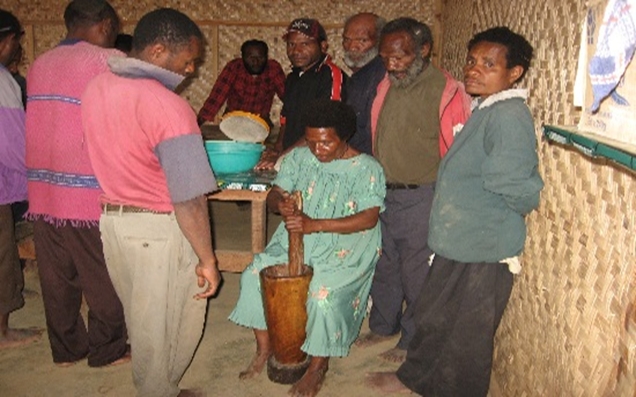
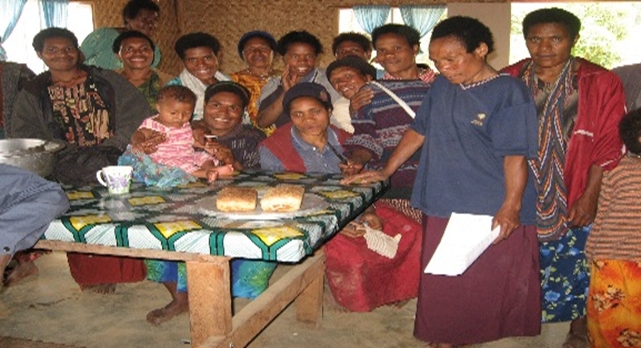
Demonstration on kaukau flour making Displaying kaukau bread
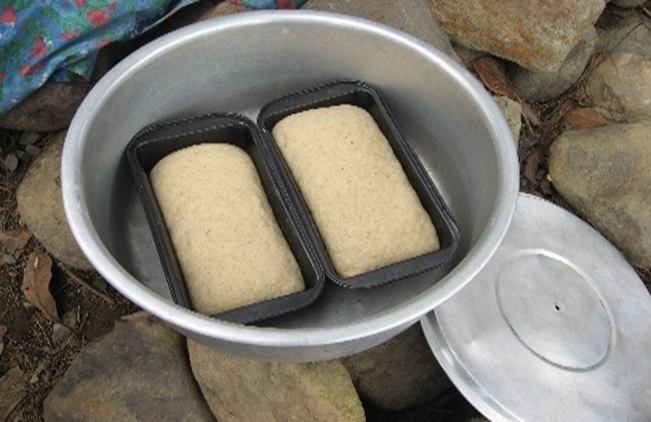
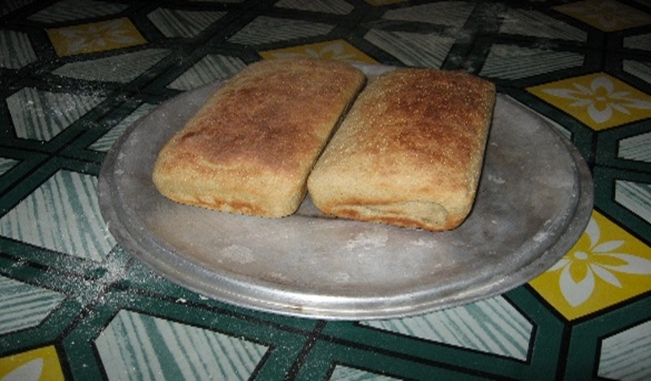
Kaukau bread finished and final product
Morobe Province
1. West taraka womens sewing
Total -80 women-3 men and 77 women
Training on basics of pattern making, clothes sewing.
2. trukai rice training-kaiapit
Total 40 people-7 Highlands, 1 Kerema-Gulf, 1 Finshaffen, 2 school teachers, 1 Boana villager and 38 Markham Valley Villagers.
3. Tent City Primary School
Tongtong making-110 students-40 females 70 males
Rice development – same as above.
Certificates of attainments were awarded after the training.
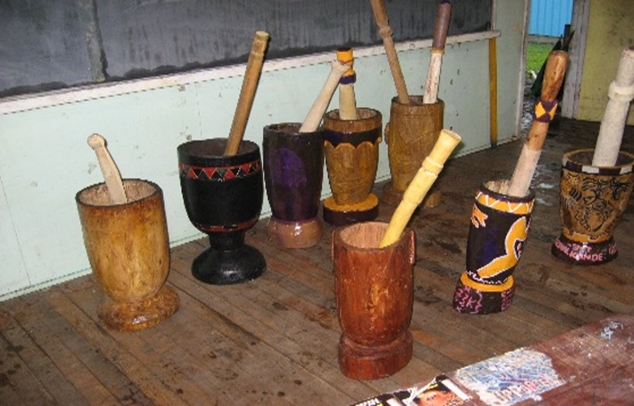
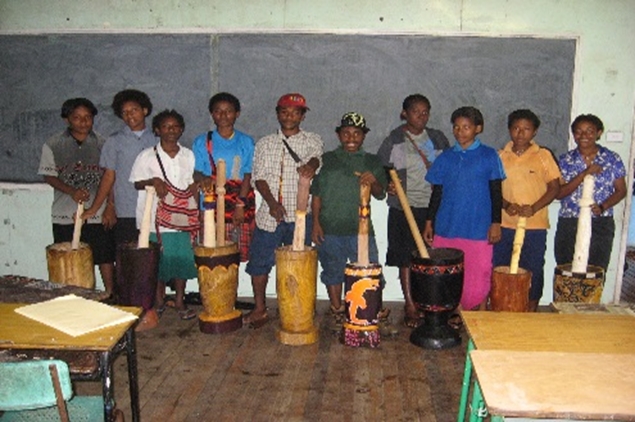
Final tongtongs displayed Students and their tongtongs
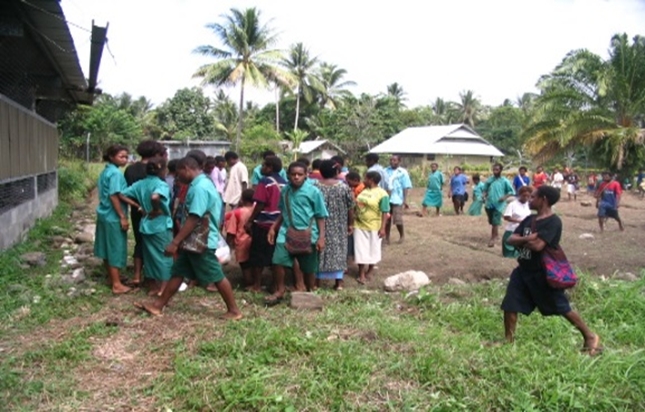
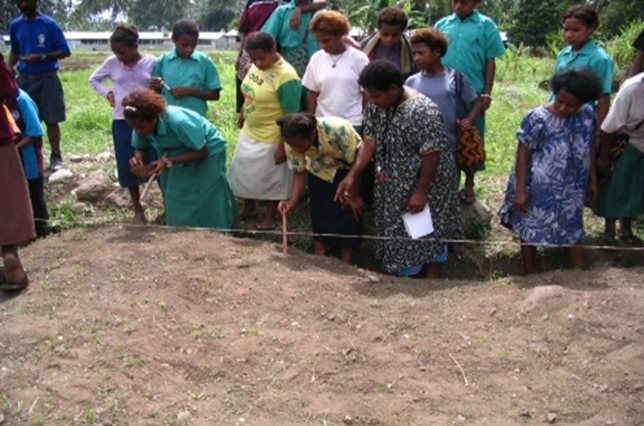
Students gathering for planting Students planting rice
3.Pohoam village-Situm, LLG-Seminar
In this seminar 13 Ward Councilors and the AIHE LLG President were present
And total of 200 men and women attended
SPISARD programmes and work were presented.
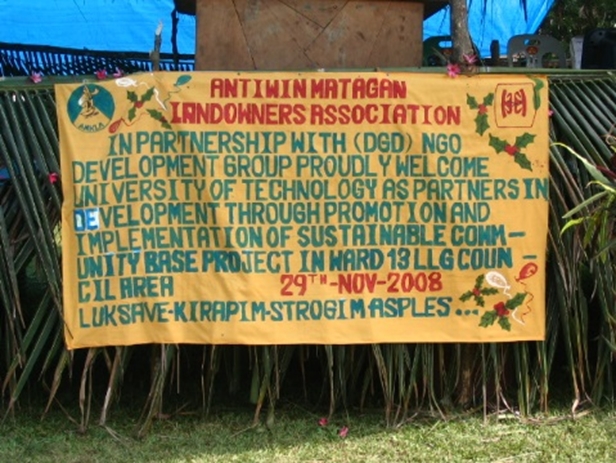
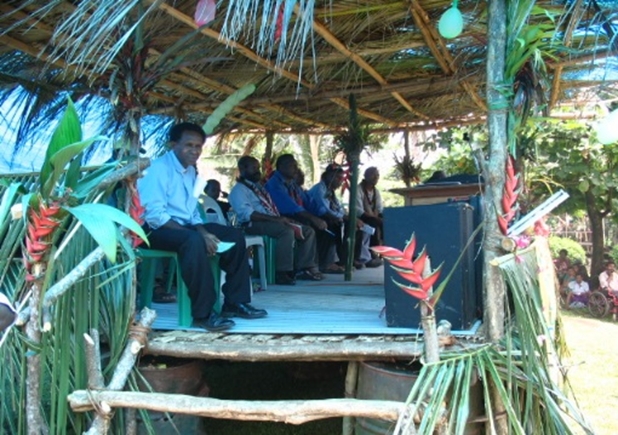
The seminar poster the seminar speakers on the platform
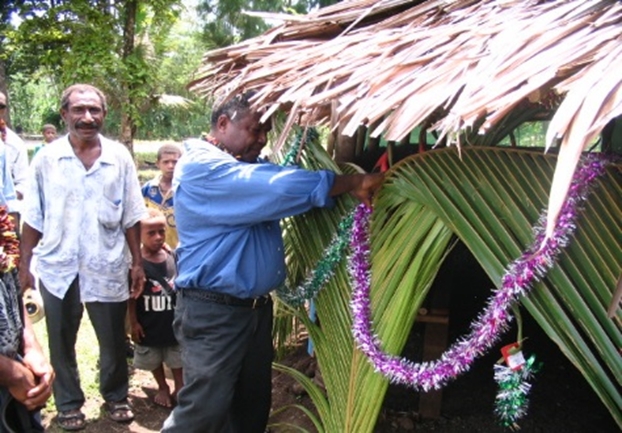
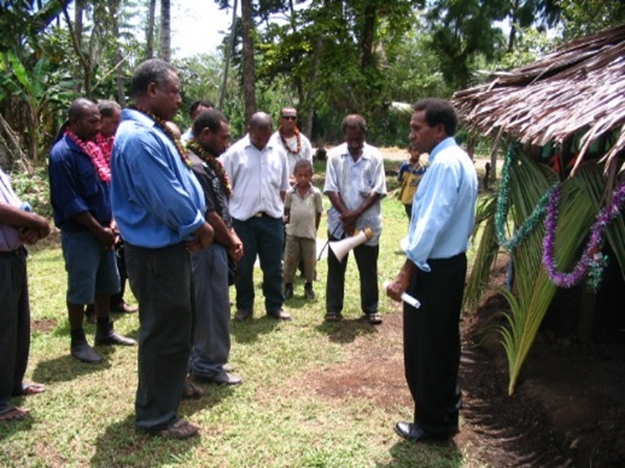
AIHE LLG President cuts the ribbons for the ward haus
Urori model village
This year we concentrate mainly on helping the villagers in completing of their model house for trainings to be conducted. This year sees the completion of the model house
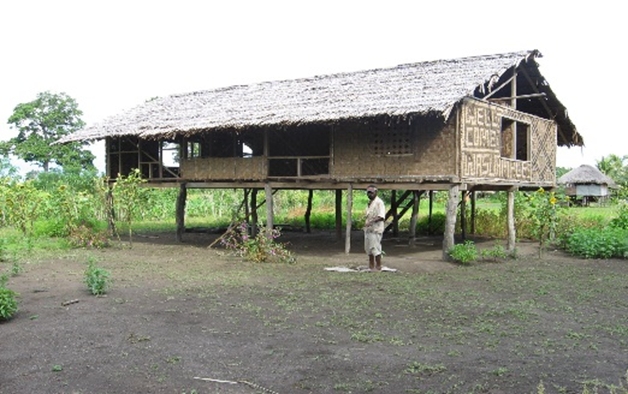
Model haus
Lutheran church mothers
Sewing and soap making
Total of 60 Lutheran church mothers were trained in sewing and soap making
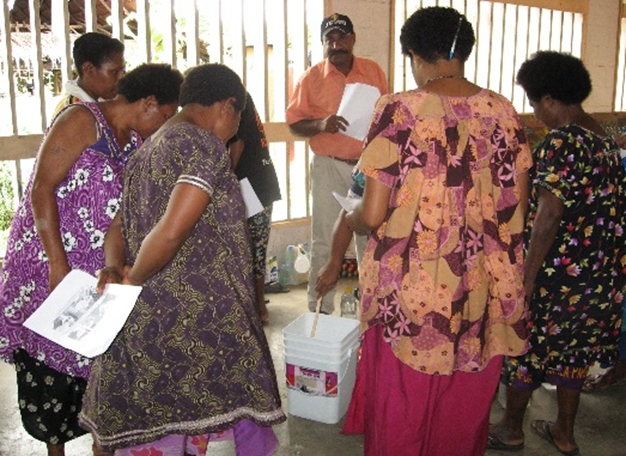
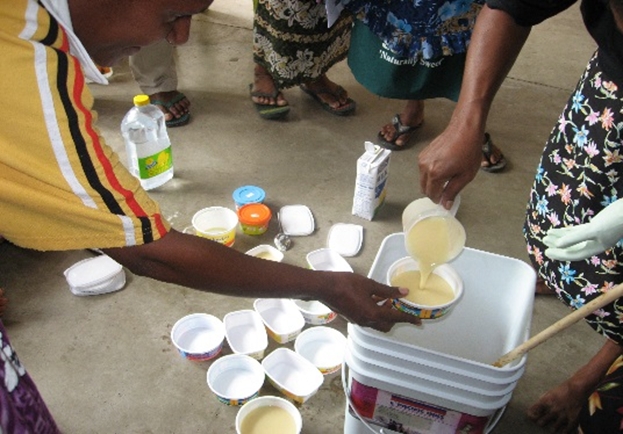
Lutheran women and their pastor preparing the soap
The mothers were awarded with certificate of attainments. A. Halim- Professor Head of the Agriculture Department presented the certificates.
Milne Bay Province
2008 SPISARD work ended in Milne Bay with well over 200 men and women were trained on soap and sugar making and a follow up on the results of rice, peanuts and African yams distribution in 2006.
Three villages were visited.
1.Savaia village-West Suau-100-men women and school children-soap making
2. Sibalai model village and-60 men, women and school children-soap making, sugar making jam, making cassava bread, and follow up on African yams, rice and peanut distribution. Over 50% grew African yams, less 30% grew peanuts and less than 5% grew rice
3.Divanai village Alotau.30 people trained on jam making, and soap making
There were no certificates of attainments awarded due to technical difficulties.
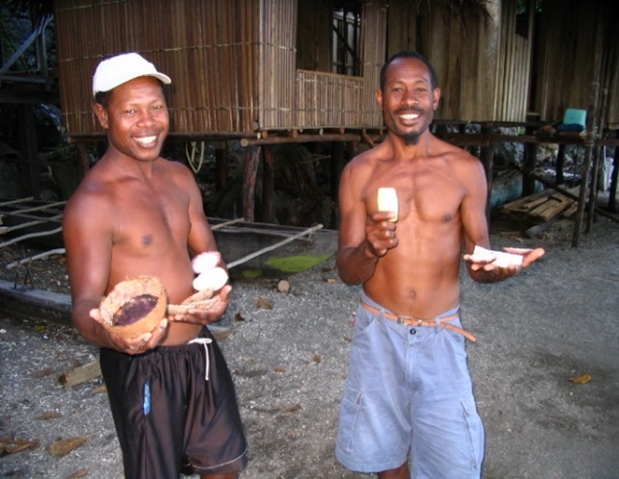
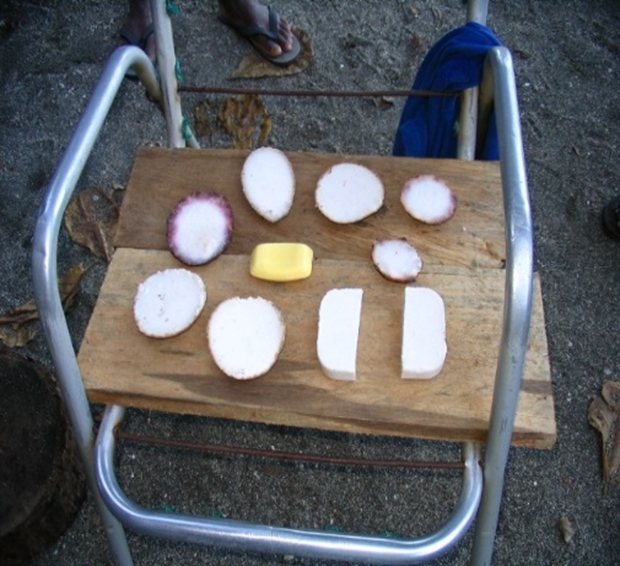
Soap displayed prepared from coconut and local moulds
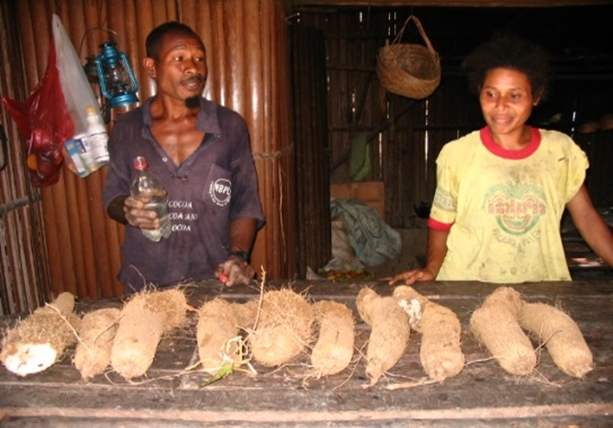
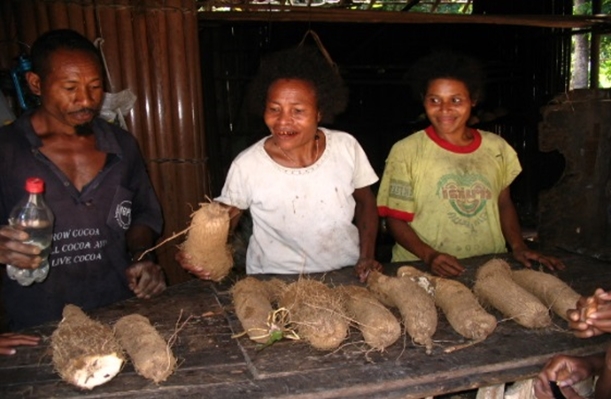
Harvest of African yams displayed by farmers
CAPACITY BUILDING
Physical Facilities
Establishment of Model Villages and Training Centres
- Tumua Model Village House & Training Centre
The village house and training centre is in near completion. Due to the environmental deficiencies, it was difficult to obtain bush materials for walling and flooring, however, funds have been given for walling and completion should be achieved by end of April 2005.
- Panamecho Model Village House & Training Centre
The model village house and training centre are both ready for programmes to start. These include living quarters, training houses and research area for plantation crops, livestock and sea farming.
- Sibalai Model Village House & Training Centre
Model village house and training centre are both ready for programmes to commence.
- Hanganofi Village [Eastern Highlands Province]
This centre is initiated by Mr. Keua, a fourth year agriculture student. His village people have constructed a model village house centre and have involved themselves with wheat farming. Mr. Keua is now writing up the constitution for his group and is trying to register the group. He has requested SPISARD to help improve the wheat farming system and look into constraints such as milling.
The Research and Development Program
An area of special mention is the new research and development programme. The Agro-socio-economic and farming systems surveys results have highlighted very interesting directions. It seems that many past similar surveys have highlighted the same area but falls on the blind end of the research results interpretations. This is what we term as ‘Donor Aids Bias Syndrome’.The results of the studies indicate that for PNG, animal production is the most limiting factor in the village food production and security chains. Most villagers are highly knowledgeable in food crop production. From the results, it will be most noticeable that the village people are not energy deficient but rather protein deficient, which is the direct result of poor animal production know how. This can be very clearly seen from any agro-socio-economic baseline surveys. However, many researchers will put a blind eye to this because this is not what the Aid Donors want. As a result, research proposals are done according to what the donors want and the proposals are sealed with words and phrases like, “sustainability”, “village development”, “less developed areas”, and other similar phrases. From the above point of view, the SPISARD research programme is concentrating on animal production, cheap sources of animal proteins and cheap animal feed sources. On the crops side, the research will concentrate on traditional food crop farming methods and plantation crops. This we believe holds some of the important factors on food security and financial security for the subsistence majority in Papua New Guinea.
Capacity Building
This is the area where a major emphasis will be placed. Development of physical facilities, curricula training programmes and information dissemination programmes. The studies on informal sector socio-economic backyard marketing, information cost survey, agro farming time management, agro-socio-economic and farming systems surveys and village families’ food consumption will highlight the importance of capacity building in the village level development. Most villagers are illiterate in financial, plantation crops & animal management and cost effective controls.Once we have properly appropriated our capacity-building programme and our modular village centres, then the extension technology transfer and training programme should flow effectively and smoothly down to the villages. For the SPISARD programme to be sustainable, it is highly advisable to work with people we know in the villages so that our facilities and information are protected and safe guarded.
Collaborative work
A very important vehicle for SPISARD is to collaborate and linkage with other stakeholders. This is the frontline of SPISARD work and need a lot of coordination with PDAL, NDAL, NGO’s, Overseas Universities, other Unitech departments and the villages. So far, there has been a lot of collaboration work with PDAL, ATCDI, Forestry Department, Civil & Mechanical Engineering Departments and EMRC.
Finance
The present source of finance is Unitech. We are also now working with PDAL (Lae) for work in Situm Village and the water source in Tumua Village. We are very confident that when our Board of Management starts functioning and our publications are out we should be able to attract Donors to further develop SPISARD. Member for Esaala and Esaala Administration sponsored 2013 and 2014 Trainings at the District. Last year (2015) Trukai Industries have sponsored all the Rice trainings and field days. This year (2016) we are funded by ACIAR for the trainings.
Summary
The SPISARD idea of bring the Papua New Guinea University of Technology to the people and villages is a very attractive and stimulating programme and very much accepted by the rural communities and the people. The demand for this program by the people is very high and we find it difficult to satisfy it. The main constraint is staff to meet the demand which at present we do not have. We are now trying to involve other departments and students in this Endeavour. We have involved ATCDI and produce a feasibility study document for water supply for Tumua people and village. We are looking donor funding. We are looking forward to update our annual in 2009.
Acknowledgement
The Institute once again saw other successful years we are truly thankful to our Almighty God for His Love and Mercy on us. Our sincere appreciation and heartfelt thanks to our main sponsors the Papua New University of Technology, and the Trukai Industries Ltd., Member for Esaala District, Hon.Member and Minister for Civial Aviation, Mr. Steven Davis and Mr. Iso Wilson, SALU Consultant Services, Salamo, ACIAR. Our sincere appreciation also go to our collaborative partners and individuals who felt obligated to help , NARI, NDAL,PDAL, the private industries and also our stakeholders, the model villages and the rural farmers. We all worked hard together to make it a wonderful year. This year (2016) ACIAR has come abroad to sponsor the trainings in the rural villages in the Highlands and new Guinea Islands.
